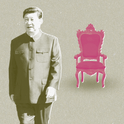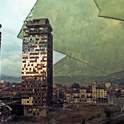Reina evoked hedonism. The club was a caricature of high Istanbul living, of decadence divorced from reality. Isolated on a piece of prime real estate on the European bank of the Bosphorus, the club had a kind of naked showiness—water taxis ferried the super rich to its doors. Reina was not representative of Turkey’s “secular elite” but of something more stereotypically, lavishly “Western.”
The terrorist who attacked it at New Year turned everything on its head—the club became a place in the firing line; its spectacular position on the Bosphorus became a disaster movie scene, as people leapt into the sea to escape. Islamic State (IS) claimed the attack that killed 39, sending a vicious message not only to secular Turks, but also to the religious president that allows such places to exist: “We hate you all.”
For IS fanatics, Turkey is almost worse than the West, a nation of fake Muslims. Yet there are distinctly fundamentalist tones in the statements of the Diyanet, Turkey’s Presidency of Religious Affairs, which regularly issues fatwas against activities including Christmas and New Year celebrations. Since the Reina attack, a high-profile imam has called a fatwa against chess, calling it more evil than gambling. Should security be introduced at chess tournaments? We find ourselves in an absurd but dangerous position when respected religious figures say things that chime with—if not inspire—the jihadis.
For 18 months, Turkey has been a blur of terrorism. It is often impossible to pick out cause and effect, and the media exploits the resulting confusion. The basic chronology is this: in the general election of June 2015, Recep Tayyip Erdogan’s Justice and Development Party (AKP) lost its ruling majority for the first time in 13 years. Five months later, it regained it in a snap election fought amid escalating fighting with Kurdish separatists. In 2016, Turkish troops entered the war in Syria, following years of covert, and not-so covert, support for rebels. After a failed coup in July, opposition leaders, journalists and random members of the public were jailed.
A terrible price is being paid for all this. The backlash against Kurdish and jihadi attacks has allowed Erdogan to play on voters’ fear, and this has altered the fabric of Turkey’s society as well as its political future. The atmosphere in Istanbul—once a fun-filled city—has palpably changed. People still go out, but with a brittle “I don’t care” stoicism. It’s a muted version of the Beirut approach to fun—music-filled clubs representing a middle finger to the terrorist threat. The difference with Lebanon is that fear has come too quickly to blend into the background. Many clubs are now empty, and tourism is 40 per cent down on the year. Europeans and Americans have fled, leaving the once-mighty tourism sector reliant on visitors from the Gulf.
Terror has done its work. In scary times, we need to have fun. We still go out, but in an unhealthy atmosphere of fear—the psychological damage may be more profound than the physical risk. While the Reina attack was terrifying, so too was the response of the authorities and the media, as well as the attitudes in wider society. Some 76 per cent of Turks now believe domestic terrorism is state-sponsored, and 80 per cent believe the US is to blame.
"Vigilante justice, a conspiracy-peddling media and a crazily emboldened government—the nightmarish triptych for 2017"The response to the attack followed a grim pattern—finger-pointing at the West, misinformation and no official accountability. Within days, two false identifications of the suspect were circulating in the press (both later cleared). Lawyers from a socialist organisation who went to lay carnations at Reina were arrested. Pro-government papers blamed the CIA and former Economist correspondent, Amberin Zaman, for masterminding the attack.
If Zaman were in Turkey, she would be at risk of arrest or attack. On New Year’s Day, hours after the incident, the fashion designer Barbaros Sansal was mobbed by an angry crowd at Istanbul airport, before being bundled into a car by plainclothes police. His crime was to have tweeted a video denouncing the events of the past year, including the arrest of scores of journalists. He is now in prison, labeled a traitor and charged with “inciting hatred among the public.”
Vigilante justice, a conspiracy-peddling media and a crazily emboldened government: this is the nightmarish triptych for 2017. While protesters face water cannons outside parliament, MPs take selfies with their supposedly secret ballots in a historic vote on changing the constitution to entrench and extend Erdogan’s power over a confused and frightened country. Reina was shocking; the bigger picture is worse.












